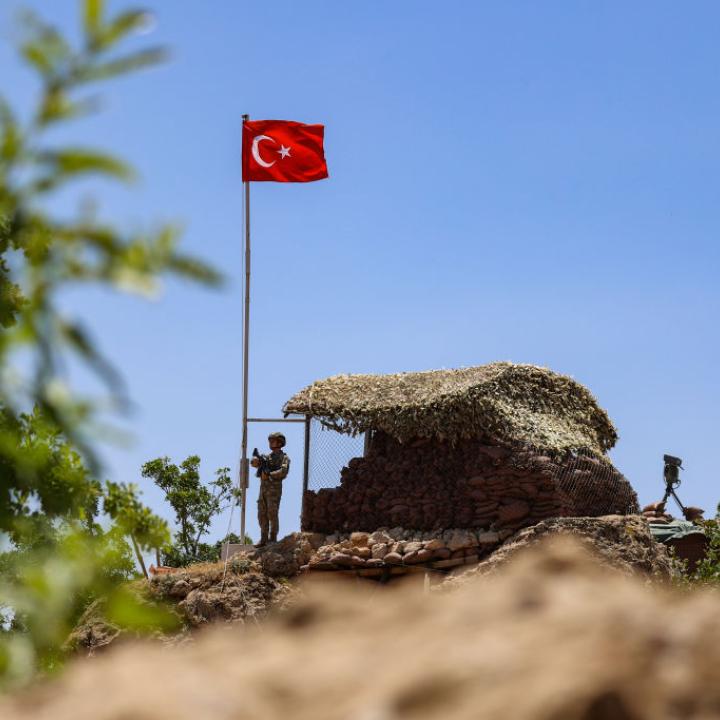
Militias Pivot Away from U.S. Targets, Toward Kurdistan and Turkish Bases

Attack metrics prove that Iran-backed groups currently see more profit in striking "near enemies" than American forces.
Drawing on the attack database maintained by The Washington Institute's Military and Security Studies Program, Militia Spotlight can use hard numbers to document how Iran-backed muqawama (resistance) militias have shifted from targeting U.S.-linked convoys and bases to attacking alternatives such as Kurdish and Turkish targets.
Anti-Coalition Attacks Fell to Very Low Levels
From January to August 2021, attacks on U.S. coalition forces in Iraq—mostly in the form of improvised explosive device (IED) attacks on Iraqi-driven coalition supply convoys—averaged 33 per month, peaking at 48 that August. These numbers declined sharply in late 2021, with muqawama groups lowering their profile considerably and committing only 13 attacks in September and 5 in October (an 89.6% drop from the August peak).
Soon thereafter, Iran-backed muqawama groups ramped their attacks on coalition targets back up. In advance of the declared end of the U.S. combat mission in Iraq on December 31, 2021, they struck coalition forces 14 times in November, 27 times in December, and 37 times in January 2022, returning to pre-lull numbers. April 2022 saw another spike, when Ashab al-Kahf, a group linked to Asaib Ahl al-Haq, embarked on a spring awakening, claiming responsibility for more than half of that month's 26 attacks on coalition forces. Apart from that surge, however, such attacks have steadily declined since February. With the ongoing uncertainty and volatility surrounding Iraq’s government formation process, muqawama groups have virtually ceased attacking coalition targets in the past two months.
Political Targeting of Kurdistan
On March 13, 2022, Iran's Islamic Revolutionary Guard Corps (IRGC) claimed responsibility for a ballistic missile strike on a villa in Erbil, the capital of the Kurdistan Region of Iraq (KRI). The IRGC accused Baz Karim—the villa's owner and CEO of KAR Group, a domestic energy company affiliated with the Kurdistan Democratic Party (KDP)—of providing a base for Israel’s Mossad. On March 16, Harakat Hezbollah al-Nujaba released a video warning the KDP to “change the status quo” in advance of a (failed) March 26 parliamentary meeting to elect Iraq's new president.
Using a combination of 107 mm Katyusha and 122 mm Grad unguided artillery rockets, muqawama groups have periodically attacked Kurdish oil facilities in the provinces of Erbil and Sulaymaniyah this year, most notably the Kawergosk refinery (owned by KAR Group) in Erbil in April-May and the Kor Mor gas field in Sulaymaniyah from June to October. They also carried out a drone strike on a pipeline carrying crude oil from the KRI to Turkey on April 10 (notably, this pipeline has been subject to vociferous criticism by the Iraqi federal government and Iranian-backed elements in the federal judiciary).
Most of these attacks, which peaked in June, were intended as “reminders” to Kurdish politicians of the consequences of siding with election winner Muqtada al-Sadr to form a “national majority government,” which would have excluded the Iranian-backed Coordination Framework from power. The pattern of exerting pressure via attacks on Kurdish oil facilities was further demonstrated when the muqawama targeted Kor Mor again on October 12, the eve of a parliamentary vote to determine Iraq’s next president.
The New "Occupiers": Militia Attacks on Turkish Targets
Militias also seem to have shifted their self-styled “resistance” activities to a different foe in 2022: the Turkish military presence in Iraq. Rocket teams fielded by the muqawama have regularly targeted the Turkish base at Zilkan, located on high ground above the militia-controlled Bashiqa subdistrict in the Nineveh Plains east of Mosul. On July 28 and August 1, militias also struck the Turkish base in Bamarni deep inside Duhok province. The frequency of these attacks increased from an average of 1.5 strikes per month in the first quarter of 2022 to 7 in April. Strikes on Turkish positions peaked in July, largely in response to a Turkish artillery strike that killed nine Iraqi civilians and wounded nearly thirty others in Duhok province on July 20.
Most of the attacks on Zilkan have been claimed by the groups Liwa Ahrar al-Iraq or Ahrar Sinjar. In its only public claim, Saraya Awliya al-Dam warned on July 24 that “this is only the beginning” after striking Zilkan—a common threat by muqawama groups promising to continue strikes on “occupation” targets until they withdraw.
Conclusion
As the U.S. military presence in Iraq has dwindled, so too have attacks on coalition supply convoys and bases. Yet this is probably due to more than just the decrease in convoy targets, since U.S. bases remain easy to attack—at least for propaganda effect if not with great lethality. The move away from targeting U.S. bases appears deliberate. Potential reasons for this switch include Iran's nuclear negotiations with the United States, a deliberate militia focus elsewhere during Iraq's government formation crisis, the difficulty of penetrating U.S. defenses, and/or a de-emphasis on the U.S. presence after the passing of last December's symbolic end to America's combat mission in Iraq.






